Camping World (CWH), the world’s largest seller of recreational vehicles (RVs) and camping supplies, posted top-and-bottom-line misses for Q2, causing a 10% dip in the stock over the past week. While the company experienced robust performance in 2020 and 2021, the current high interest rates and pricing deflation have affected sales. But, with expectations of an upcycle once rates decrease, an aggressive expansion plan with over 100 new locations by 2028, and a recent dividend yield of 4.78%, Camping World remains a consideration for income-oriented investors.
Don't Miss our Black Friday Offers:
- Unlock your investing potential with TipRanks Premium - Now At 40% OFF!
- Make smarter investments with weekly expert stock picks from the Smart Investor Newsletter

Camping World’s Growth Plan
Camping World is a retailer of recreational vehicles (RVs) and related products and services. The company operates two segments: Good Sam Services and Plans and RV and Outdoor Retail. Additionally, the company operates a membership organization, Good Sam Club, and a rental platform connecting travelers with RV owners.
Camping World has 215 store locations nationwide but plans to grow its market share to 320 locations by 2028. As part of its strategic growth plan, the company divests less performing or non-core assets, such as recently selling off an RV dealership location and its furniture manufacturing business. These actions aim to free up capital and potentially improve sales and margins in the company’s parts and aftermarket business.
Camping World’s Recent Financial Results
For the second quarter of 2024, Camping World reported revenue of $1.81 billion, falling short of analysts’ estimates of $1.88 billion and a year-over-year decline of 5.0%. Despite the decrease in overall revenue, there was a notable rise in new vehicle revenue, which increased 5.8% to $847.1 million. New vehicle unit sales also increased by 16.9%.
However, due to discounting efforts, the average selling price of new and used vehicles declined by 9.5% and 12.6%, respectively. Used car sales decreased by 22.8%, reducing used vehicle sales by 11.7%.
Gross profit declined by 4.1% to $547.7 million, while gross margin improved by 27 basis points to 30.3%. These changes were mainly due to the decrease in revenue and were somewhat influenced by fluctuating margins in various business areas. The company also managed to have slightly reduced selling, general, and administrative expenses.
However, interest expenses rose significantly due to higher interest rates and larger principal balances. Ultimately, the net income for the quarter declined by 63.8% to $23.4 million, with a decrease in adjusted EBITDA by 24.2%. Earnings per share of $0.38 fell below the analysts’ estimate of $0.50.
What Is the Price Target for CWH Stock?
The stock has been volatile, with a beta of 1.68, as it bounced around the past few years while declining, losing 40% in the past three years overall. It trades at the lower end of its 52-week price range of $16.18 – $29.24 and shows negative price momentum, trading below the 20-day (21.20) and 50-day (20.69) moving averages. The P/S ratio of 0.25x suggests the stock is slightly undervalued compared to peers in the Auto & Truck Dealerships industry, where the average P/S ratio is 0.46x.
Analysts following the company have been bullish on the stock. Citi analyst James Hardiman recently reiterated a Buy rating on the shares and set a price target of $26.00, noting record new vehicle unit market share and growth in same-store sales despite a challenging industry environment. This growth trajectory, combined with CWH strategic acquisition of dealerships, suggests a potential for substantial market leverage once the industry recovers.
Based on the recommendations and price targets recently assigned by five analysts, Camping World Holdings is rated a Strong Buy overall. The average price target for CWH stock is $26.25, representing a potential 31.12% upside from current levels.

Closing Thoughts on Camping World
Despite a challenging financial quarter, Camping World continues to hold promise as the world’s largest retailer of recreational vehicles (RVs) and camping supplies. Recent high interest rates and pricing deflation have impacted sales. Still, the company’s aggressive expansion strategy, coupled with an attractive dividend yield, makes it a compelling option for income-oriented investors.



















